Fleurs du Mal Magazine


Or see the index

G e o r g e E l i o t
(Mary Ann Evans, 1819 – 1880)
In a London Drawingroom
The sky is cloudy, yellowed by the smoke.
For view there are the houses opposite
Cutting the sky with one long line of wall
Like solid fog: far as the eye can stretch
Monotony of surface & of form
Without a break to hang a guess upon.
No bird can make a shadow as it flies,
For all is shadow, as in ways o’erhung
By thickest canvass, where the golden rays
Are clothed in hemp. No figure lingering
Pauses to feed the hunger of the eye
Or rest a little on the lap of life.
All hurry on & look upon the ground,
Or glance unmarking at the passers by
The wheels are hurrying too, cabs, carriages
All closed, in multiplied identity.
The world seems one huge prison-house & court
Where men are punished at the slightest cost,
With lowest rate of colour, warmth & joy.
![]()
George Eliot poetry
kempis poetry magazine
More in: Archive E-F, Eliot, George

O s c a r W i l d e
(1854-1900)
Impression Du Matin
The Thames nocturne of blue and gold
Changed to a Harmony in grey:
A barge with ochre-coloured hay
Dropt from the wharf: and chill and cold
The yellow fog came creeping down
The bridges, till the houses’ walls
Seemed changed to shadows and St. Paul’s
Loomed like a bubble o’er the town.
Then suddenly arose the clang
Of waking life; the streets were stirred
With country waggons: and a bird
Flew to the glistening roofs and sang.
But one pale woman all alone,
The daylight kissing her wan hair,
Loitered beneath the gas lamps’ flare,
With lips of flame and heart of stone.
.jpg)
O s c a r W i l d e p o e t r y
k e m p i s p o e t r y m a g a z i n e
More in: Wilde, Oscar
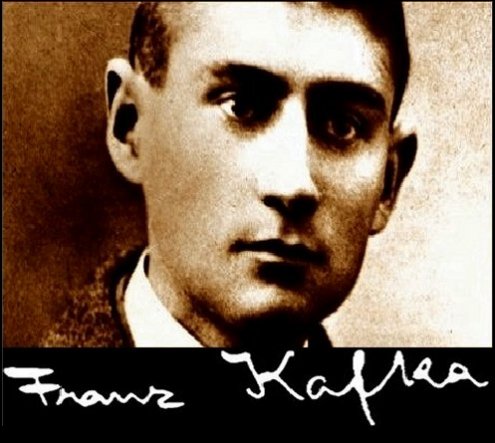
Vor dem Gesetz
Franz Kafka (1883-1924)
Vor dem Gesetz steht ein Türhüter. Zu diesem Türhüter kommt ein Mann vom Lande und bittet um Eintritt in das Gesetz. Aber der Türhüter sagt, daß er ihm jetzt den Eintritt nicht gewähren könne. Der Mann überlegt und fragt dann, ob er also später werde eintreten dürfen. »Es ist möglich,« sagt der Türhüter, »jetzt aber nicht.« Da das Tor zum Gesetz offensteht wie immer und der Türhüter beiseite tritt, bückt sich der Mann, um durch das Tor in das Innere zu sehn. Als der Türhüter das merkt, lacht er und sagt: »Wenn es dich so lockt, versuche es doch, trotz meines Verbotes hineinzugehn. Merke aber: Ich bin mächtig. Und ich bin nur der unterste Türhüter. Von Saal zu Saal stehn aber Türhüter, einer mächtiger als der andere. Schon den Anblick des dritten kann nicht einmal ich mehr ertragen.« Solche Schwierigkeiten hat der Mann vom Lande nicht erwartet; das Gesetz soll doch jedem und immer zugänglich sein, denkt er, aber als er jetzt den Türhüter in seinem Pelzmantel genauer ansieht, seine große Spitznase, den langen, dünnen, schwarzen tatarischen Bart, entschließt er sich, doch lieber zu warten, bis er die Erlaubnis zum Eintritt bekommt. Der Türhüter gibt ihm einen Schemel und läßt ihn seitwärts von der Tür sich niedersetzen. Dort sitzt er Tage und Jahre. Er macht viele Versuche, eingelassen zu werden, und ermüdet den Türhüter durch seine Bitten. Der Türhüter stellt öfters kleine Verhöre mit ihm an, fragt ihn über seine Heimat aus und nach vielem andern, es sind aber teilnahmslose Fragen, wie sie große Herren stellen, und zum Schlusse sagt er ihm immer wieder, daß er ihn noch nicht einlassen könne. Der Mann, der sich für seine Reise mit vielem ausgerüstet hat, verwendet alles, und sei es noch so wertvoll, um den Türhüter zu bestechen. Dieser nimmt zwar alles an, aber sagt dabei: »Ich nehme es nur an, damit du nicht glaubst, etwas versäumt zu haben.« Während der vielen Jahre beobachtet der Mann den Türhüter fast ununterbrochen. Er vergißt die andern Türhüter und dieser erste scheint ihm das einzige Hindernis für den Eintritt in das Gesetz.
Er verflucht den unglücklichen Zufall, in den ersten Jahren rücksichtslos und laut, später, als er alt wird, brummt er nur noch vor sich hin. Er wird kindisch, und, da er in dem jahrelangen Studium des Türhüters auch die Flöhe in seinem Pelzkragen erkannt hat, bittet er auch die Flöhe, ihm zu helfen und den Türhüter umzustimmen. Schließlich wird sein Augenlicht schwach, und er weiß nicht, ob es um ihn wirklich dunkler wird, oder ob ihn nur seine Augen täuschen. Wohl aber erkennt er jetzt im Dunkel einen Glanz, der unverlöschlich aus der Türe des Gesetzes bricht. Nun lebt er nicht mehr lange. Vor seinem Tode sammeln sich in seinem Kopfe alle Erfahrungen der ganzen Zeit zu einer Frage, die er bisher an den Türhüter noch nicht gestellt hat. Er winkt ihm zu, da er seinen erstarrenden Körper nicht mehr aufrichten kann. Der Türhüter muß sich tief zu ihm hinunterneigen, denn der Größen unterschied hat sich sehr zu ungunsten des Mannes verändert. »Was willst du denn jetzt noch wissen?« fragt der Türhüter, »du bist unersättlich.« »Alle streben doch nach dem Gesetz,« sagt der Mann, »wieso kommt es, daß in den vielen Jahren niemand außer mir Einlaß verlangt hat?« Der Türhüter erkennt, daß der Mann schon an seinem Ende ist, und, um sein vergehendes Gehör noch zu erreichen, brüllt er ihn an: »Hier konnte niemand sonst Einlaß erhalten, denn dieser Eingang war nur für dich bestimmt. Ich gehe jetzt und schließe ihn.«
Franz Kafka : Ein Landarzt. Kleine Erzählungen (1919)
fleursdumal.nl magazine
More in: Archive K-L, Franz Kafka, Kafka, Franz, Kafka, Franz
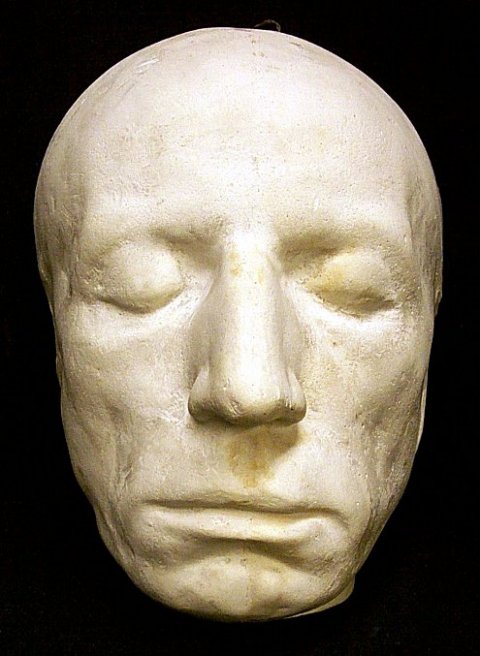
W i l l i a m W o r d s w o r t h
(1770-1850)
A C o m p l a i n t
There is a change–and I am poor;
Your Love hath been, nor long ago,
A Fountain at my fond Heart’s door,
Whose only business was to flow;
And flow it did; not taking heed
Of its own bounty, or my need.
What happy moments did I count!
Bless’d was I then all bliss above!
Now, for this consecrated Fount
Of murmuring, sparkling, living love,
What have I? shall I dare to tell?
A comfortless, and hidden WELL.
A Well of love–it may be deep–
I trust it is, and never dry:
What matter? if the Waters sleep
In silence and obscurity.
–Such change, and at the very door
Of my fond Heart, hath made me poor.
.jpg)
William Wordsworth poetry
kempis poetry magazine
More in: Wordsworth, William

‘Hier wil ik begraven worden in het zand’
Over Jan Naaijkens en Anton Eijkens
Door Jef van Kempen
Jan Naaijkens (1919) en Anton Eijkens (1920) zijn al bevriend vanaf het begin van de jaren veertig. Ze werkten samen in de redacties van Brabantia Nostra en Edele Brabant. In die tijd leerden zij Walter Breedveld kennen en een groot aantal andere coryfeeën van de Brabantse letteren.
Jan Naaijkens, vijfentwintig jaar lang organisator van de Groot-Kempische Cultuurdagen, ontmoette Walter Breedveld voor het eerst in 1954 toen diens roman Hexspoor werd bekroond met de literatuurprijs van de gemeente Hilvarenbeek. De auteur was gevraagd was om uit zijn werk voor te lezen en Breedveld deed dat tamelijk goed. “Hij had een nogal mooie, donkere, fluwelige stem. Maar hij wist van geen ophouden. We hadden een kwartier afgesproken, wat vrij lang is om naar een lezing te luisteren, maar Breedveld las maar door. Op een gegeven moment begon Van Duinkerken met zijn ring, quasi speels, op de tafel te tikken. Maar niemand had de moed om in te grijpen. Toen er na een half uur voor een stampvolle zaal eindelijk een eind aan kwam, slaakte iedereen een zucht van verlichting. Dat vond ik toch wel typisch voor Breedveld, die ging altijd door. Ik denk dat hij ook zo schreef”.
Frans Babylon heeft nog regelmatig bij Anton Eijkens op zolder gelogeerd. “Hij was een beetje de Poèt Maudit en omdat ik in die tijd veel Verlaine en Rimbaud las, konden we daar heerlijk over praten.” Hij erkent dat Frans Babylon, ondanks zijn zwakheden, iemand was waar je graag mee had te doen. Als Anton Eijkens moest gaan werken, zei Babylon: “Ga jij maar, ik kom mijn dag wel door. Hij ging dan overal buurten onder het genot van een fles wijn.” Als Eijkens ‘s avonds thuis kwam zat Babylon op hem te wachten.
Anton Eijkens had een grote bewondering voor Antoon Coolen. “Ik heb ooit intensief contact met hem gehad over de publicatie van een novelle in het boek Land en volk van Brabant, dat verschenen is in 1949. Maar wij konden het niet eens worden over mijn bijdrage. Hij vond een aantal dingen niet waarachtig genoeg en hij probeerde mij er toe te bewegen om die passages te herschrijven. Dat weigerde ik, schrijverstrots van een aankomend auteur, maar ik denk achteraf dat hij volkomen gelijk had.”
Jan Naaijkens leerde Coolen kennen in de eerste jaren van de oorlog. “Antoon Coolen gaf heel veel lezingen over het Brabantse en Nederlandse volkskarakter. Dat deed hij bijzonder goed, vooral in die oorlogsomstandigheden kreeg dat extra gewicht. Toen merkte ik al de merkwaardige discrepantie op tussen de man die De Peel en de mensen van De Peel beschrijft en daarbij hun taalgebruik hanteert en de zeer precieuze, keurig onberispelijk Nederlands sprekende schrijver met zijn bekende lavallière.”
Jan Naaijkens beschouwde Anton van Duinkerken als een soort halfgod. “Ik bewonderde hem om zijn werk en als mens. Als Van Duinkerken in Hilvarenbeek was, sliep hij bij mij thuis. Toen hij een keer de hele dag door had gedronken, zeulde ik met hem over straat en kwamen we langs de toren. Daar stond hij plotseling stil en zei: ‘Hier wil ik begraven worden: in het zand, in het zand, in het zand, niet in dat stinkende veen.”
Gerard Knuvelder was als persoon volkomen anders geaard dan Van Duinkerken. Hij was, net als Coolen, heel formeel. Je hoefde bij hem niet op bezoek te komen als je dat niet had aangekondigd en je werd ontvangen vanachter een bureau. Knuvelder had iets patriarchaals over zich. Als je hem beter leerde kennen, bleek het ook een hartelijke man te kunnen zijn. Op Anton Eijkens en Jan Naaijkens hebben zijn vroege geschriften veel invloed gehad, met name zijn boek Vanuit wingewesten.
Ook Pieter van der Meer de Walcheren maakte indruk op beide auteurs, vooral in de jaren dertig en veertig. Anton Eijkens: “Zoals hij schreef en de gloed van zijn geloofsovertuiging heeft toen op veel jongeren in Brabant indruk gemaakt. Je kreeg iets van die heilige aandrift mee om iets te betekenen als katholiek en als auteur. (…) Ik kijk nog wel eens naar oude foto’s, albums en zo. Maar als ik er een tijdje in zit te bladeren, denk ik bij mezelf, waar ben je nu eigenlijk mee bezig. Ik wordt er niet echt verdrietig van, maar het is wel allemaal heel erg melancholisch voor een zwakke ziel als ik.”
(Eerder gepubliceerd in: Brabants Dagblad – foto jef van kempen)
Jef van Kempen over Jan Naaijkens en Anton Eijkens
• fleursdumal.nl magazine
More in: Anton van Duinkerken, Antoon Coolen, Brabantia Nostra, Eijkens, Anton, Jan Naaijkens, Jef van Kempen, Literaire sporen
.jpg)
V i c t o r H u g o
(1802-1885)
S o i r
Dans les ravins la route oblique
Fuit. – Il voit luire au-dessus d’eux
Le ciel sinistre et métallique
A travers des arbres hideux.
Des êtres rôdent sur les rives ;
Le nénuphar nocturne éclôt ;
Des agitations furtives
Courbent l’herbe, rident le flot.
Les larges estompes de l’ombre,
Mêlant les lueurs et les eaux,
Ébauchent dans la plaine sombre
L’aspect monstrueux du chaos.
Voici que les spectres se dressent.
D’où sortent-ils ? que veulent-ils ?
Dieu ! de toutes parts apparaissent
Toutes sortes d’affreux profils !
Il marche. Les heures sont lentes.
Il voit là-haut, tout en marchant,
S’allumer ces pourpres sanglantes,
Splendeurs lugubres du couchant.
Au loin, une cloche, une enclume,
Jettent dans l’air leurs faibles coups.
A ses pieds flotte dans la brume
Le paysage immense et doux.
Tout s’éteint. L’horizon recule.
Il regarde en ce lointain noir
Se former dans le crépuscule
Les vagues figures du soir.
La plaine, qu’une brise effleure,
Ajoute, ouverte au vent des nuits,
A la solennité de l’heure
L’apaisement de tous les bruits.
A peine, ténébreux murmures,
Entend-on, dans l’espace mort,
Les palpitations obscures
De ce qui veille quand tout dort.
Les broussailles, les grès, les ormes,
Le vieux saule, le pan de mur,
Deviennent les contours difformes
De je ne sais quel monde obscur.
L’insecte aux nocturnes élytres
Imite le cri des sabbats.
Les étangs sont comme des vitres
Par où l’on voit le ciel d’en bas.
Par degrés, monts, forêts, cieux, terre,
Tout prend l’aspect terrible et grand
D’un monde entrant dans un mystère,
D’un navire dans l’ombre entrant.
.jpg)
Victor Hugo poetry
fleursdumal.nl magazine
More in: Archive G-H, Archive G-H, Hugo, Victor, Victor Hugo

Erika De Stercke
Gedicht
Draden lang
als zeewieren
gebruik je mij
glad en gemakkelijk verteerbaar
woelige woorden liggen op lakens
tussen zand en zwetende tenen
leugens, net kwallen kleven op
de badkuip
bruine randen
er waren al tekens
de muren houden hun verkalkte snavel dicht
op een halfnatte handdoek
ligt gescheurd een meisjesdroom
Erika De Stercke (Ninove 1968), woont en werkt in Gent. Ze volgde ‘Literaire creatie’ aan de Academie – afdeling Woord te Deinze en trad meermaals op bij slams en open podia in België en Nederland. Erika De Stercke was o.a. gastdichter bij Simon Vinkenoog – Onbederflijk Vers 2008 te Nijmegen. Erika De Stercke: “Schrijven geeft mij veel voldoening, soms ook wel frustratie als een woord mij niet loslaat. (…) Mijn rugzak zit vol met papierstrookjes waarop ik gedachten neerschrijf. (…) De verhalen van vrienden en gebeurtenissen in de stad, op de trein pik ik op en ze beginnen een eigen leven te leiden. Aan inspiratie geen gebrek.”
Erika De Stercke poetry
kempis poetry magazine
More in: De Stercke, Erika
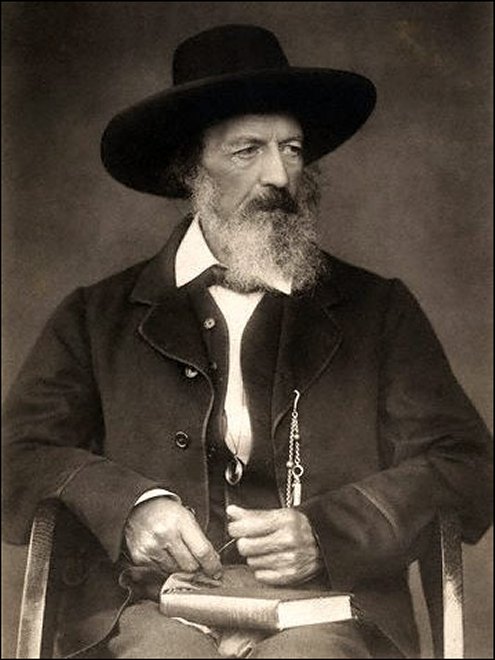
Alfred Lord Tennyson
(1809-1892)
T h e T a l k i n g O a k
Once more the gate behind me falls;
Once more before my face
I see the moulder’d Abbey-walls,
That stand within the chace.
Beyond the lodge the city lies,
Beneath its drift of smoke;
And ah! with what delighted eyes
I turn to yonder oak.
For when my passion first began,
Ere that, which in me burn’d,
The love, that makes me thrice a man,
Could hope itself return’d;
To yonder oak within the field
I spoke without restraint,
And with a larger faith appeal’d
Than Papist unto Saint.
For oft I talk’d with him apart,
And told him of my choice,
Until he plagiarised a heart,
And answer’d with a voice.
Tho’ what he whisper’d, under Heaven
None else could understand;
I found him garrulously given,
A babbler in the land.
But since I heard him make reply
Is many a weary hour;
‘Twere well to question him, and try
If yet he keeps the power.
Hail, hidden to the knees in fern,
Broad Oak of Sumner-chace,
Whose topmost branches can discern
The roofs of Sumner-place!
Say thou, whereon I carved her name,
If ever maid or spouse,
As fair as my Olivia, came
To rest beneath thy boughs.–
"O Walter, I have shelter’d here
Whatever maiden grace
The good old Summers, year by year,
Made ripe in Sumner-chace:
"Old Summers, when the monk was fat,
And, issuing shorn and sleek,
Would twist his girdle tight, and pat
The girls upon the cheek.
"Ere yet, in scorn of Peter’s-pence,
And number’d bead, and shrift,
Bluff Harry broke into the spence,
And turn’d the cowls adrift:
"And I have seen some score of those
Fresh faces, that would thrive
When his man-minded offset rose
To chase the deer at five;
"And all that from the town would stroll,
Till that wild wind made work
In which the gloomy brewer’s soul
Went by me, like a stork:
"The slight she-slips of loyal blood,
And others, passing praise,
Strait-laced, but all too full in bud
For puritanic stays:
"And I have shadow’d many a group
Of beauties, that were born
In teacup-times of hood and hoop,
Or while the patch was worn;
"And, leg and arm with love-knots gay,
About me leap’d and laugh’d
The Modish Cupid of the day,
And shrill’d his tinsel shaft.
"I swear (and else may insects prick
Each leaf into a gall)
This girl, for whom your heart is sick,
Is three times worth them all;
"For those and theirs, by Nature’s law,
Have faded long ago;
But in these latter springs I saw
Your own Olivia blow,
"From when she gamboll’d on the greens,
A baby-germ, to when
The maiden blossoms of her teens
Could number five from ten.
"I swear, by leaf, and wind, and rain
(And hear me with thine ears),
That, tho’ I circle in the grain
Five hundred rings of years–
"Yet, since I first could cast a shade,
Did never creature pass
So slightly, musically made,
So light upon the grass:
"For as to fairies, that will flit
To make the greensward fresh,
I hold them exquisitely knit,
But far too spare of flesh."
Oh, hide thy knotted knees in fern,
And overlook the chace;
And from thy topmost branch discern
The roofs of Sumner-place.
But thou, whereon I carved her name,
That oft hast heard my vows,
Declare when last Olivia came
To sport beneath thy boughs.
"O yesterday, you know, the fair
Was holden at the town;
Her father left his good arm-chair,
And rode his hunter down.
"And with him Albert came on his.
I look’d at him with joy:
As cowslip unto oxlip is,
So seems she to the boy.
"An hour had past–and, sitting straight
Within the low-wheel’d chaise,
Her mother trundled to the gate
Behind the dappled grays.
"But, as for her, she stay’d at home,
And on the roof she went,
And down the way you use to come,
She look’d with discontent.
"She left the novel half-uncut
Upon the rosewood shelf;
She left the new piano shut:
She could not please herself.
"Then ran she, gamesome as the colt,
And livelier than a lark
She sent her voice thro’ all the holt
Before her, and the park.
"A light wind chased her on the wing,
And in the chase grew wild,
As close as might be would he cling
About the darling child:
"But light as any wind that blows
So fleetly did she stir,
The flower she touch’d on dipt and rose,
And turn’d to look at her.
"And here she came, and round me play’d,
And sang to me the whole
Of those three stanzas that you made
About my ‘giant bole’;
"And in a fit of frolic mirth
She strove to span my waist:
Alas, I was so broad of girth,
I could not be embraced.
"I wish’d myself the fair young beech
That here beside me stands,
That round me, clasping each in each,
She might have lock’d her hands.
"Yet seem’d the pressure thrice as sweet
As woodbine’s fragile hold,
Or when I feel about my feet
The berried briony fold."
O muffle round thy knees with fern,
And shadow Sumner-chace!
Long may thy topmost branch discern
The roofs of Sumner-place!
But tell me, did she read the name
I carved with many vows
When last with throbbing heart I came
To rest beneath thy boughs?
"O yes, she wander’d round and round
These knotted knees of mine,
And found, and kiss’d the name she found,
And sweetly murmur’d thine.
"A teardrop trembled from its source,
And down my surface crept.
My sense of touch is something coarse,
But I believe she wept.
"Then flush’d her cheek with rosy light,
She glanced across the plain;
But not a creature was in sight:
She kiss’d me once again.
"Her kisses were so close and kind,
That, trust me on my word,
Hard wood I am, and wrinkled rind,
But yet my sap was stirr’d:
"And even into my inmost ring
A pleasure I discern’d
Like those blind motions of the Spring,
That show the year is turn’d.
"Thrice-happy he that may caress
The ringlet’s waving balm
The cushions of whose touch may press
The maiden’s tender palm.
"I, rooted here among the groves,
But languidly adjust
My vapid vegetable loves
With anthers and with dust:
"For, ah! my friend, the days were brief
Whereof the poets talk,
When that, which breathes within the leaf,
Could slip its bark and walk.
"But could I, as in times foregone,
From spray, and branch, and stem,
Have suck’d and gather’d into one
The life that spreads in them,
"She had not found me so remiss;
But lightly issuing thro’,
I would have paid her kiss for kiss
With usury thereto."
O flourish high, with leafy towers,
And overlook the lea,
Pursue thy loves among the bowers,
But leave thou mine to me.
O flourish, hidden deep in fern,
Old oak, I love thee well;
A thousand thanks for what I learn
And what remains to tell.
"’Tis little more: the day was warm;
At last, tired out with play,
She sank her head upon her arm,
And at my feet she lay.
"Her eyelids dropp’d their silken eaves.
I breathed upon her eyes
Thro’ all the summer of my leaves
A welcome mix’d with sighs.
"I took the swarming sound of life–
The music from the town–
The murmurs of the drum and fife
And lull’d them in my own.
"Sometimes I let a sunbeam slip,
To light her shaded eye;
A second flutter’d round her lip
Like a golden butterfly;
"A third would glimmer on her neck
To make the necklace shine;
Another slid, a sunny fleck,
From head to ancle fine.
"Then close and dark my arms I spread,
And shadow’d all her rest–
Dropt dews upon her golden head,
An acorn in her breast.
"But in a pet she started up,
And pluck’d it out, and drew
My little oakling from the cup,
And flung him in the dew.
"And yet it was a graceful gift–
I felt a pang within
As when I see the woodman lift
His axe to slay my kin.
"I shook him down because he was
The finest on the tree.
He lies beside thee on the grass.
O kiss him once for me.
"O kiss him twice and thrice for me,
That have no lips to kiss,
For never yet was oak on lea
Shall grow so fair as this."
Step deeper yet in herb and fern,
Look further thro’ the chace,
Spread upward till thy boughs discern
The front of Sumner-place.
This fruit of thine by Love is blest,
That but a moment lay
Where fairer fruit of Love may rest
Some happy future day.
I kiss it twice, I kiss it thrice,
The warmth it thence shall win
To riper life may magnetise
The baby-oak within.
But thou, while kingdoms overset,
Or lapse from hand to hand,
Thy leaf shall never fail, nor yet
Thine acorn in the land.
May never saw dismember thee,
Nor wielded axe disjoint,
That art the fairest-spoken tree
From here to Lizard-point.
O rock upon thy towery top
All throats that gurgle sweet!
All starry culmination drop
Balm-dews to bathe thy feet!
All grass of silky feather grow–
And while he sinks or swells
The full south-breeze around thee blow
The sound of minster bells.
The fat earth feed thy branchy root,
That under deeply strikes!
The northern morning o’er thee shoot
High up, in silver spikes!
Nor ever lightning char thy grain,
But, rolling as in sleep,
Low thunders bring the mellow rain,
That makes thee broad and deep!
And hear me swear a solemn oath,
That only by thy side
Will I to Olive plight my troth,
And gain her for my bride.
And when my marriage morn may fall,
She, Dryad-like, shall wear
Alternate leaf and acorn-ball
In wreath about her hair.
And I will work in prose and rhyme,
And praise thee more in both
Than bard has honour’d beech or lime,
Or that Thessalian growth,
In which the swarthy ringdove sat,
And mystic sentence spoke;
And more than England honours that,
Thy famous brother-oak,
Wherein the younger Charles abode
Till all the paths were dim,
And far below the Roundhead rode,
And humm’d a surly hymn.
.jpg)
Alfred Lord Tennyson poetry
kempis poetry magazine
More in: Tennyson, Alfred Lord
.jpg)
William Shakespeare
(1564-1616)
THE SONNETS
32
If thou survive my well-contented day,
When that churl death my bones with dust shall cover
And shalt by fortune once more re-survey
These poor rude lines of thy deceased lover:
Compare them with the bett’ring of the time,
And though they be outstripped by every pen,
Reserve them for my love, not for their rhyme,
Exceeded by the height of happier men.
O then vouchsafe me but this loving thought,
‘Had my friend’s Muse grown with this growing age,
A dearer birth than this his love had brought
To march in ranks of better equipage:
But since he died and poets better prove,
Theirs for their style I’ll read, his for his love’.
![]()
kempis poetry magazine
More in: -Shakespeare Sonnets
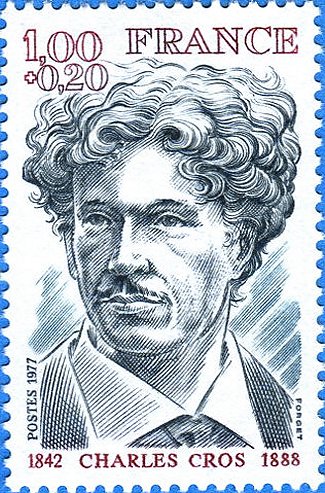
C h a r l e s C r o s
(1842-1888)
L e s q u a t r e s a i s o n s
Les quatre saisons – L’automne
L’automne fait les bruits froissés
De nos tumultueux baisers.
Dans l’eau tombent les feuilles sèches
Et sur ses yeux, les folles mèches.
Voici les pèches, les raisins,
J’aime mieux sa joue et ses seins.
Que me fait le soir triste et rouge,
Quand sa lèvre boudeuse bouge ?
Le vin qui coule des pressoirs
Est moins traître que ses yeux noirs
Les quatre saisons – L’été
En été les lis et les roses
Jalousaient ses tons et ses poses,
La nuit, par l’odeur des tilleuls
Nous nous en sommes allés seuls.
L’odeur de son corps, sur la mousse,
Est plus enivrante et plus douce.
En revenant le long des blés,
Nous étions tous deux bien troublés.
Comme les blés que le vent frôle,
Elle ployait sur mon épaule.
Les quatre saisons – L’hiver
C’est l’hiver. Le charbon de terre
Flambe en ma chambre solitaire.
La neige tombe sur les toits.
Blanche ! Oh, ses beaux seins blancs et froids !
Même sillage aux cheminées
Qu’en ses tresses disséminées.
Au bal, chacun jette, poli,
Les mots féroces de l’oubli,
L’eau qui chantait s’est prise en glace,
Amour, quel ennui te remplace !
Les quatre saisons – Le printemps
Au printemps, c’est dans les bois nus
Qu’un jour nous nous sommes connus.
Les bourgeons poussaient vapeur verte.
L’amour fut une découverte.
Grâce aux lilas, grâce aux muguets,
De rêveurs nous devînmes gais.
Sous la glycine et le cytise,
Tous deux seuls, que faut-il qu’on dise ?
Nous n’aurions rien dit, réséda,
Sans ton parfum qui nous aida.
.jpg)
Charles Cros poetry
kempis poetry magazine
More in: Archive C-D, Cros, Charles
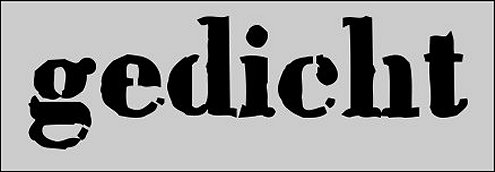
Leo van der Sterren
Kleine litanie van oude zielen
diep in droge breinen
linksaf de hoek om
de markering volgen
haarspeldbocht als darmrivier
ondergronds door hersens
verbindt de kwab de lob
bes en besje uil geknapt
synaps maar in de gang
staat een beeld van geest
van marmer of van geest
’t is niet uit te maken
dat beeld torent hoog
maar laag is het de ziel
de broedplaats van het
ongenode dat duwt en
perst de schuwheid uit
de luwte in de zenuwen
een gruwel maar de hersens
halen hun verhalen
in de uitstreken de uithalen
uithoeken van zichzelf
en jagen ze furieus en wit
heet het huis uit woonstee der
ziel rechtsaf de hoek om
wegbewijzering weg
gewezen dan kwijt
verloren en terecht de hersens
vermist meanderend
de harde horde in
van de sensuele symfonie
van de van de weet
veel vector lamstraal
wrede voren harde lente
want de horde tiert op jong
en jong doet pijn in oude
en verzaakte zielen in halve
en vermolmde lijven
met breinen uitgeloogd
Leo van der Sterren poetry
kempis poetry magazine
More in: Sterren, Leo van der
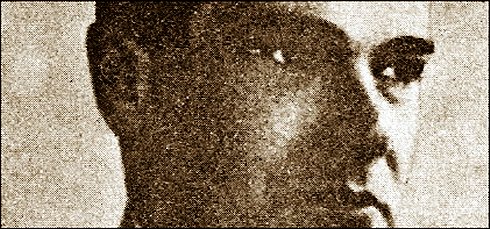
Georg Trakl
(1887-1914)
Der Abend
Mit toten Heldengestalten
Erfüllst du Mond
Die schweigenden Wälder,
Sichelmond-
Mit der sanften Umarmung
Der Liebenden,
Den Schatten berühmter Zeiten
Die modernden Felsen rings;
So bläulich erstrahlt es
Gegen die Stadt hin,
Wo kalt und böse
Ein verwesend Geschlecht wohnt,
Der weißen Enkel
Dunkle Zukunft bereitet.
Ihr mondverschlungnen Schatten
Aufseufzend im leeren Kristall
Des Bergsees.
.jpg)
Georg Trakl poetry
kempis poetry magazine
More in: Trakl, Georg
Thank you for reading Fleurs du Mal - magazine for art & literature